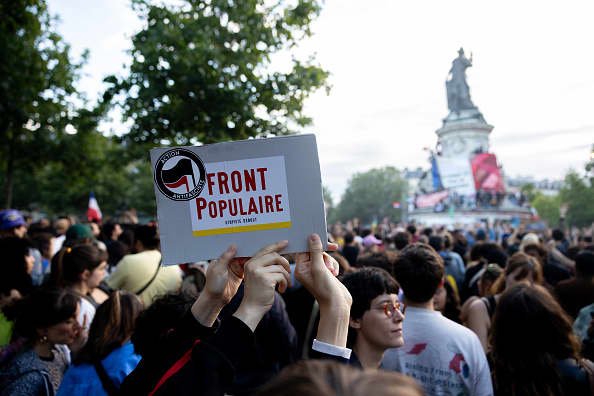Supporters of the left-wing coalition “New Popular Front” gather at the Place de la Republique in Paris, France, on July 7, 2024, after the far-right’s defeat in the French legislative elections.
Anadolu | Anadolu | Getty Images
French government bond market saw early sell-off upon On Monday, there was a fairly muted reaction overall, despite the political deadlock following the second round of parliamentary elections.
Yields on 10-year French government bonds, which move inversely to prices, rose 3 basis points at the open but quickly fell thereafter to be roughly flat at 3.221 percent at around 9:30 a.m. London time.
Uncertainty has been rife in French bond markets in recent weeks, with 10-year yields climbing above 3.3%, their highest level in nearly eight months, after French President Emmanuel Macron called early parliamentary elections in mid-June.
Meanwhile, the spread between French and German government bond yields has exceeded 85 basis points in recent weeks, reaching its highest level since 2012.
It fell as the election drew closer, but on Monday the gap widened to more than 70 basis points before falling again to around 67 basis points.
The relative calm continues despite the difficult fiscal situation France faces. Two weeks ago, the European Commission announced that France was to be subject to deficit measures after it failed to keep its budget deficit below 3% of its gross domestic product. Deficit measures are measures initiated by the European Commission against EU member states that exceed budget deficit limits or fail to reduce their debt.
This meant that the tax and spending plans of both the left-wing New Popular Front and the far-right National Rally (RN) parties were a major concern in the run-up to the general election.
Sunday’s vote saw the New Popular Front coalition unexpectedly win the most seats in the country’s parliament but fail to secure an absolute majority. French President Emmanuel Macron’s Ensemble party and its alliance came in second, while the far-right National Rally, which won the first round and was expected to maintain its strength in the runoff, came in third.
David Roche, president and global strategist at Independent Strategies, said in a note Sunday that a left-leaning coalition victory could actually end up being worse economically than a National Coalition government.
He said the sense of relief at avoiding a landslide victory for the far-right RN party would be short-lived and recommended shorting French bonds over German ones.
Francois Digard, head of French equity research at Kepler Chevreux, said a parliamentary limbo had been largely priced into the market but that the left would prevail more than expected.
“We expect to see a negative reaction in both the index and spreads, with spreads potentially widening and potentially returning to levels seen 10 days ago,” he told CNBC.
He added that the left-wing coalition still has a chance of facing Brussels, but not as much as if the National Rally had won. Digard added that what matters now is who is named prime minister.
—CNBC’s Jeni Reid contributed to this article.

